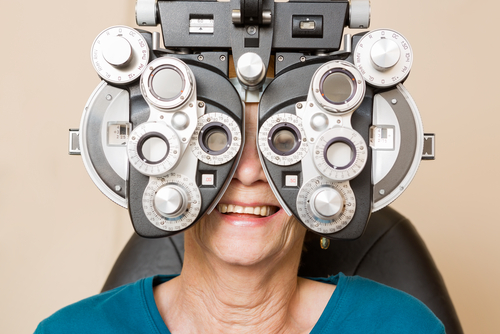 Regular Eye Exams are Important
Regular Eye Exams are Important
The health of our eyes is extremely important to our quality of life. Regular eye exams should be an important part of everyone's health care regime, especially those who suffer from chronic health conditions (such as diabetes or high blood pressure).
If you experience changes in your vision between routine visits with your eye specialist, you should call and arrange to be checked as soon as possible. Early detection of problems and treatment of diseases or conditions can be key to vision loss prevention. Many people, who make regular visits to their medical doctor or dentist, neglect to ensure their visual health with regular visits to their eye doctor. Those people don’t realize that 80% of all the sensory information our brains receive comes from our eyes.
When an eye care professional checks a patient’s vision, he or she is measuring visual acuity. Visual Acuity is the measurement of the smallest object a person can see without corrective lenses, or with glasses or contact lenses, if they are needed. The goal of an eye care professional is to improve the patient's corrected visual acuity.
To check a patient’s visual acuity an eye care professional may use various tools. The Snellen eye chart is the most familiar tool used to test eyes. It was developed by Dutch ophthalmologist Hermann Snellen In 1862. It contains letters and numbers that are presented to the patient at a distance of twenty feet. A patient taking this test covers one eye, and reads aloud the letters of each row, beginning at the top. The smallest row that can be read accurately indicates the patient's visual acuity in that eye. Whenever acuity must be assessed carefully, equipment may be used that can present the letters in a variety of randomized patterns.
If a person has 20/40 vision, they would need to approach to a distance of twenty feet to read letters that a person with normal acuity could read at forty feet. A person is legally blind when they have 20/200 vision. They can only see at twenty feet what a normal eye can see at two hundred feet.
When a person calls to make an eye appointment with their Greenville Eye Doctor, he or she should be prepared to describe any current vision problems. In addition, patients should ask if the eye examination will affect their vision temporarily and if they will need someone to drive them home. They may also want to ask about the cost of the exam, if their insurance plan will cover any of the cost, and how payment is handled.
Before coming to your appointment you should gather and bring the following items and information to help answer questions that we may ask you.
A person experiencing any of the following symptoms should schedule an appointment with an eye professional:
Schedule testing for children when they will be most cooperative, and able to participate if at all possible. If children have difficulty with their attention span or have developmental or communication impairments, they may not test well even though they can see well. Be sure to alert your Greenville eye doctor to any problems in this area.
Discuss the Exam's Findings and Treatments Prescribed
Advanced Eye Care encourages its patients to take an active role in their health care. It is important to communicate any confusion you have surrounding an issue; to get a clear understanding of your condition status, and to learn about maintaining the health of your eyes. Below are some suggestions to keep in mind when talking to Dr. Phillips:
2014. All Rights Reserved. Medical website design by Glacial Multimedia ©
The material contained on this site is for informational purposes only and is not intended to be a substitute for professional medical advice, diagnosis, or treatment. Always seek the advice of your physician or other qualified health care provider.

